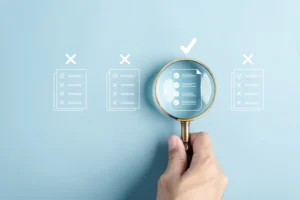In today’s digital-first learning environment, online exams are no longer a novelty — they are the norm. Whether it’s higher education, corporate certifications, or licensure tests, institutions and organizations worldwide are embracing remote assessment platforms for their convenience and scalability. But with great convenience comes a greater risk: data breaches. From leaking exam questions to exposing personal candidate information, the consequences of compromised exam data can be devastating. That’s where online proctoring steps in—not just as an exam monitor, but as a digital guardian of privacy, integrity, and trust.
This blog explores how modern online proctoring systems go beyond mere invigilation to protect sensitive data from cyber threats and breaches. From real-time monitoring and secure browsers to encryption protocols and compliance measures, proctoring tools have evolved into full-fledged data protection allies.
It is one thing to read about our amazing solution and another to experience it in action.
Secure Exam Environments: Lockdown Modes and Safe Browsers
One of the fundamental steps to protect exam data is to ensure that it can’t be accessed, copied, or shared during the exam process. Online proctoring platforms deploy secure lockdown browsers that restrict candidates from:
- Opening new tabs or applications
- Taking screenshots or recording the screen
- Copying and pasting content
- Accessing unauthorized files or websites
These lockdown environments create a sealed digital room, ensuring that the question paper and test interface remain secure from manipulation or exposure.
Additionally, remote proctoring solutions often combine this with live or AI monitoring to detect suspicious behavior, like screen mirroring, external devices, or remote access tools. If a breach attempt is detected, proctors can pause or terminate the exam in real time, safeguarding both exam content and the overall system.
A proactive security approach minimizes cheating risks while ensuring a seamless test experience at budget-friendly pricing.
Know our Pricing!
Encryption and Secure Data Transmission: Keeping Breaches at Bay
While a secure exam interface is essential, the transmission and storage of exam data—such as personal details, answers, and video recordings—also need airtight protection. Modern proctoring systems follow end-to-end encryption protocols, ensuring that data is:
- Encrypted in transit (while being transferred over the internet)
- Encrypted at rest (when stored on servers)
This means even if hackers intercept the data, it remains unreadable without a decryption key. Many top-tier proctoring providers follow industry best practices such as:
- TLS (Transport Layer Security) to protect data in motion
- AES-256 encryption for stored data
- Role-based access controls to restrict who can view or modify sensitive information
- Multi-factor authentication (MFA) to prevent unauthorized access to admin dashboards
Moreover, some platforms utilize geofencing, IP monitoring, and device fingerprinting to trace and authenticate legitimate users and identify anomalies early on.
Compliance with Global Privacy Laws and Institutional Integrity
Proctoring systems must comply with international data protection regulations to prevent legal, reputational, and financial consequences from data mishandling. This includes frameworks such as:
- GDPR (General Data Protection Regulation) for European users
- FERPA (Family Educational Rights and Privacy Act) for U.S. academic institutions
- PIPEDA and FIPPA in Canada
- SOC 2 Type II and ISO/IEC 27001 for information security management
Adherence to these laws ensures that student data, video recordings, identity documents, and exam results are collected with consent, stored securely, and used only for legitimate purposes. Proctoring platforms that meet these standards are routinely audited and must demonstrate data minimization, retention controls, and incident response protocols.
Institutions and organizations are also increasingly asking for Data Processing Agreements (DPAs) and detailed privacy policies from proctoring vendors, ensuring mutual accountability and transparency.
Summing up
As cyber threats grow more sophisticated, simply conducting exams online isn’t enough. Protecting sensitive exam data—from candidate profiles to test content—requires a holistic security strategy. Online proctoring platforms are stepping up with a layered defense model that combines secure browsers, AI-powered surveillance, robust encryption, and regulatory compliance.
In a world where a single breach can erode years of trust, proctoring doesn’t just supervise an exam—it safeguards its very credibility. By investing in secure proctoring tools, institutions and organizations don’t just prevent cheating—they protect the future of learning.






